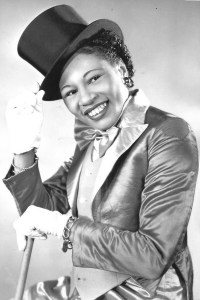
Gee Gee James Refuses To Bow To St. Louis Jim-Crow ‘NO KITCHEN DOOR FOR ME” So said she after being told she had to enter a nightclub through the back door. In 1939, after being invited to see a play by the general manager of the Whites-Only Club Plantation in St Louis, Gee Gee was unpleasantly surprised to find when she got there that she would have to go in through the back door and through the kitchen. She said that she “did not see why she should not be allowed to go through the front door like all the other paying guests.” She also said she “just can’t quite get used to prejudice and jim crowism.”
Apparently the Club Plantation was a hot spot in 1939 and was considered one of the outstanding spots In the nation and one of the most pleasing places for Black artists and entertainers to work, however Blacks were not allowed in to see the shows. Gee Gee was invited in because she was in vogue at the time as an actress, but they still would not let her arrive through the front door.
 Never having experienced this I tend to forget that Black entertainers of the early 1900s faced blatant racism constantly. Maybe even daily. It had to have been a constant stressor. Yet, actors like Gee Gee and my father, Eddie Green, lit up a room when they walked in. They were gracious off stage and dedicated to their craft on stage. These trailblazers have, because of their fortitude, become my heroes. I chose to write about Gee Gee James today because she and my father were once comedic partners. But like Eddie before I wrote my book, Gee Gee has pretty much been forgotten or over-looked. In this extremely bad copy you can see her from 1937: “Luis Russell, Eddie Green, Gee Gee James and Louie Armstrong, who on Friday night, over station WJZ, under the sponsorship of the Fleischman Yeast Company, made show world history.”—Photo by Continental News 1937
Never having experienced this I tend to forget that Black entertainers of the early 1900s faced blatant racism constantly. Maybe even daily. It had to have been a constant stressor. Yet, actors like Gee Gee and my father, Eddie Green, lit up a room when they walked in. They were gracious off stage and dedicated to their craft on stage. These trailblazers have, because of their fortitude, become my heroes. I chose to write about Gee Gee James today because she and my father were once comedic partners. But like Eddie before I wrote my book, Gee Gee has pretty much been forgotten or over-looked. In this extremely bad copy you can see her from 1937: “Luis Russell, Eddie Green, Gee Gee James and Louie Armstrong, who on Friday night, over station WJZ, under the sponsorship of the Fleischman Yeast Company, made show world history.”—Photo by Continental News 1937
I found this wonderful article by Billy Rowe, a well-known Black journalist of the Pittsburgh Courier (1937):
ROWE NEW YORK, April 15,—”A packed house, a wildly enthusiastic audience, an atmosphere of intense joy. A leader with a captivating personality, directing a band, which like himself, knew how to swing . . . Standing before the ears of the nation awaiting the signal to commence *the first all-colored coast to coast radio program. Yes, it was a great achievement, and a personal triumph for all connected with the presentation of Louie Armstrong and his orchestra, Gee Gee James and Eddie Green, for they were the feature players making history in the world of colored show business.”

Exterior
Property of Shubert Archive
Gee Gee had been in show business a few years before appearing on the radio program. She and her husband, actor Ernest Whitman, who also performed with my father, were featured in an Old Time Radio program “The Gibsons“. She was also a singer, a dancer and a Broadway star.
As a matter of fact, Gee Gee was performing on Broadway when she got the invite to the Club Plantation. The play was No Time for Comedy at the Barrymore Theatre in 1939, and ran for 179 performances. The cast included Laurence Olivier as Gaylord Esterbrook and Katharine Cornell. Gee Gee was cast as “Clementine” and “has been received in millions of American homes via the airwaves and who is savoring success after success.”
Gee Gee James refused to be treated as less than any other human being just because she happened to be Black. In 1939. And she was successful. She helped pave the way for other Black people, other minorities, and other women to be treated with respect and dignity. I believe we must remember and uphold these trailblazers, and not let them fade out of view. Because though they are no longer here, they are still role-models and worthy of continued attention.
Well, after writing this I feel like I have just made a speech. So I will bow and say thank you, for stopping by.
Check me out on Facebook, too.
And thanx greg at dejawho
